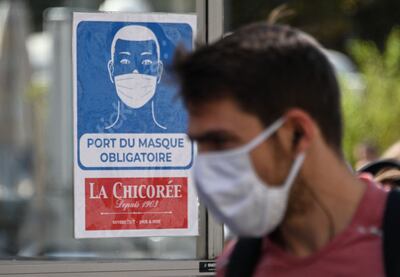A mere “whiff of infected breath” is enough exposure to Omicron to catch the most transmissible variant of coronavirus, according to a leading scientist tracking the record-setting spread of Covid-19.
Prof Peter Openshaw, a member of the New and Emerging Respiratory Virus Threats Advisory Group (Nervtag), said the speed of the emergence of Omicron was down to it being "so infectious" to the general public.
“We’re lucky really that it wasn’t this infectious when it first moved into human-to-human transmission," he said. “We’ve had several iterations of this virus going through different stages of its evolution.
“It has ended up being so infectious that it almost needs just a whiff of infected breath and you could get infected."
Many countries have elevated advice to wear face masks to counter the aerosol spread of Omicron, including France which has made it mandatory outdoors in built up areas. There is also a drive to increase vaccination rates in response to rising infections. Developed countries were able to rely on vaccines, including booster doses, to ride the wave of the relatively mild Omicron, but other nations would not be so lucky, Prof Openshaw said.
“We’re in a relatively good position in countries like the UK but I think you have to remember that in many parts of the world the vaccination rates are only about 5 per cent, and they’re being exposed to this very infectious virus with very little protection,” he said.
In South Africa, where the variant first emerged, the test positivity rate rose on Thursday to 28.1 per cent, far exceeding the 5 per cent that the World Health Organisation deemed tolerable for health systems in previous waves of the disease.
“Numbers are still up in South Africa, especially the positivity rate,” Tulio de Oliveira, the head of gene sequencing institutions in South Africa who presented findings about Omicron last month, said on Twitter. “We are still not out of the woods.”
Africa’s most industrialised nation also reported 126 deaths on Thursday, the most since the discovery of the Omicron variant. Hospital admissions also increased.
To remove the rest of the Covid restrictions, South Africa needs to accelerate vaccinations, said Wolfgang Preiser, head of medical virology at Stellenbosch University in the Western Cape.

Only then “we can be more confident that, whatever happens and even with breakthrough infections, there won’t be bad consequences” Mr Preiser on Friday told local radio broadcaster 702. “We need to keep immunity levels up. And as that improves in the country, it will be time to also walk away from the other restrictions.”
The Philippines has detected just four Omicron cases but its infection numbers have soared to a two-month high.
The health ministry recorded 2,961 new coronavirus infections on Friday and reported a positivity rate of 10.3 per cent. "It is prudent to assume that Omicron is already in circulation, or is already in the community," Health Secretary Francisco Duque said.


